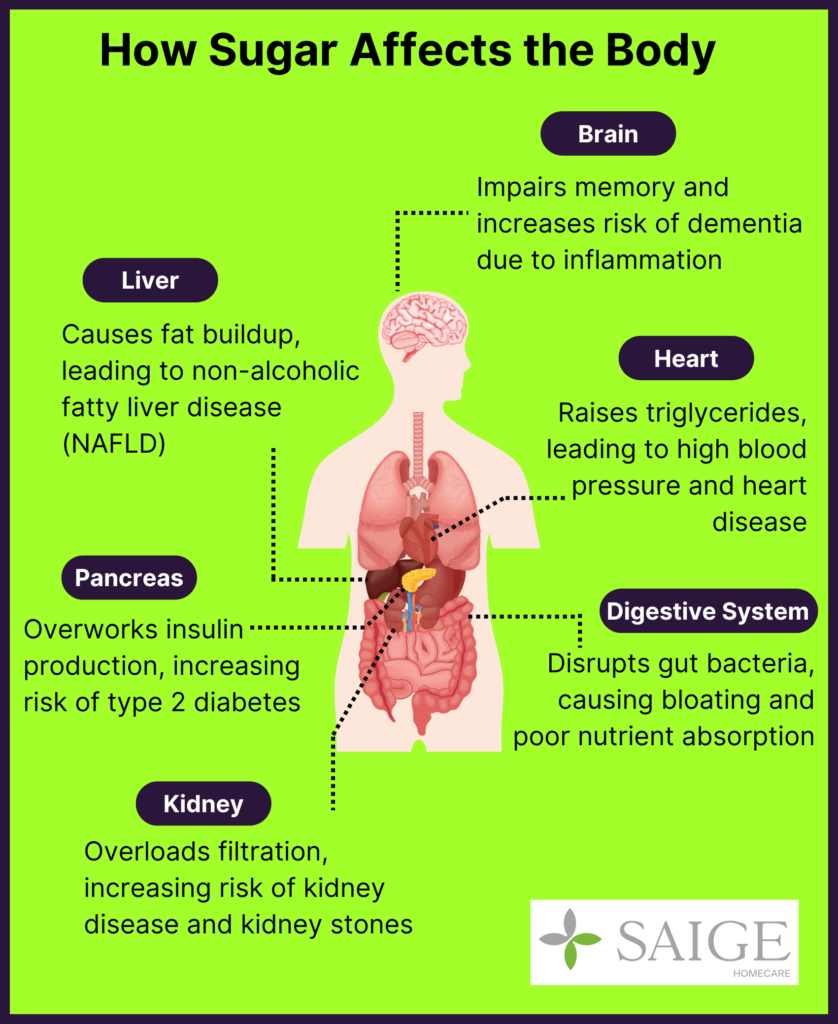Did you know that seniors consume about 20.3 grams of added sugar per day on average? That’s a significant number, considering how vulnerable they are to sugar-related health issues.
Sugar is everywhere, from your morning coffee to your favorite snacks; sugar sneaks into our diets in ways we might not even realize. While it adds sweetness to our lives, it also comes with some serious health risks, especially for seniors.
If you’re a caregiver, you’ve probably wondered, how much sugar is too much, and how can we help our loved ones manage their intake? Let’s explore Normal Sugar Levels for Adults, sugar’s role in weight gain, and practical tips for keeping it in check.
The Bitter Truth: Sugar and Aging
Sugar is a staple in many diets, but its overconsumption can lead to more than just a sweet tooth. It’s linked to weight gain, chronic diseases, and even cognitive decline. Understanding the role sugar plays in their health is the first step in making informed dietary choices.
Seniors often crave sugar more than younger adults, due to changes in taste or emotional eating. Instead of cutting out sugar completely, focus on healthier options like fruits or low-sugar snacks to satisfy cravings. For those with existing health conditions, it’s important to follow specific recommendations from a doctor or dietitian to keep sugar intake safe.
With mindful choices, seniors can enjoy a little sweetness while staying healthy.
Does Sugar Make You Fat?: How Sugar Contributes to Weight Gain
Does Sugar Make You Fat? The answer to the question is yes. We’ve all heard that sugar can make you gain weight, but how exactly does it work? Here’s the breakdown:
1. Empty Calories with No Nutritional Value
Sugar is high in calories but provides no essential nutrients like fiber, vitamins, or minerals. This means seniors consuming foods high in sugar often take in extra calories without feeling full, leading to overeating. Among elderly individuals, added sugars account for around 8.4% of their daily caloric intake, a significant portion that doesn’t offer much nutritional value.
2. Sugar Promotes Fat Storage
When we consume sugar, the body converts some of it into energy. However, when there’s too much sugar, the liver turns the excess into fat. This fat often builds up around the abdomen as visceral fat, which is closely linked to heart disease and other serious health problems.
3. Insulin Spikes and Resistance
Every time we eat sugar, it causes a spike in blood sugar levels. This prompts the body to release insulin to process the sugar. Over time, repeated spikes can lead to insulin resistance, a condition where the body struggles to regulate blood sugar and stores more of it as fat. This slower metabolism can make weight management even more difficult for seniors.
4. Sugar Tricks Your Hunger Hormones
Consuming sugar doesn’t just satisfy a sweet tooth; it also affects the hormones that control hunger. Sugar stimulates ghrelin, the hormone that tells your brain you’re hungry, even when you’ve eaten enough. This is why sugary snacks often leave you craving more and contribute to overeating, creating a cycle that’s hard to break.
5. Liquid Calories Add Up Quickly
Sugary drinks like soda, sweetened teas, and fruit juices are some of the biggest culprits of hidden sugar. They provide calories without making you feel full, leading to unintentional overconsumption. For seniors, this is particularly concerning, as regular consumption of sugary drinks has also been linked to a decline in cognitive health.
6. Sugar Slows Down Metabolism
When sugar dominates the diet, the body prioritizes processing it over burning fat. This can slow the metabolism, making it harder to shed pounds or maintain a healthy weight. Over time, a sugar-heavy diet contributes to fat accumulation and reduced energy levels.
7. Fatty Liver Disease Complicates Matters
Excess sugar, especially fructose found in processed foods, is a leading cause of non-alcoholic fatty liver disease (NAFLD). This condition not only affects liver health but also disrupts the body’s ability to regulate fat and sugar metabolism, making weight gain more likely.
Understanding Normal Sugar Levels for Adults and Their Impact on Health
Understanding normal blood sugar levels is crucial for maintaining overall health and preventing conditions like prediabetes and diabetes. Here’s a guide to healthy blood sugar ranges and how sugar intake affects them:
What Are Normal Blood Sugar Levels?
- Fasting Blood Sugar: 70–99 mg/dL (measured after not eating for at least 8 hours).
- Post-Meal Blood Sugar: Less than 140 mg/dL (measured 2 hours after eating).
- A1C (Average Blood Sugar over 3 Months): Less than 5.7%.
These ranges reflect a healthy balance of sugar in the bloodstream, which the body maintains through the production and regulation of insulin.
How Excess Sugar Impacts Blood Sugar Levels
- Increased Blood Sugar Spikes:
Consuming large amounts of sugar quickly raises blood glucose levels. Over time, this can lead to insulin resistance, where the body struggles to regulate blood sugar effectively. - Risk of Prediabetes:
Persistent high blood sugar levels (100–125 mg/dL fasting) are an early warning sign of prediabetes, a condition that can progress to type 2 diabetes if not managed. - Diabetes and Long-Term Effects:
Consistently high blood sugar levels damage blood vessels and nerves, increasing the risk of complications such as heart disease, kidney damage, and vision problems.
By keeping blood sugar levels within the normal range, adults can reduce their risk of chronic conditions and maintain overall well-being.
How Much Sugar Is Safe for Seniors?
So, how much sugar is okay? The World Health Organization (WHO) recommends that added sugars make up less than 10% of daily calories, but for seniors, 5% is even better.
Safe Sugar Intake Guidelines
- Men: No more than 37.5 grams (9 teaspoons) of added sugar per day.
- Women: No more than 25 grams (6 teaspoons).
- Seniors: Aim for 20–25 grams (5–6 teaspoons) due to lower calorie needs.
Quick Example: Calculating Sugar for Seniors
- Average daily calorie needs: 1,800 calories.
- 5% of 1,800 calories = 90 calories from sugar.
- 1 gram of sugar = 4 calories, so that’s about 22.5 grams of sugar per day.
The Bigger Picture: Beyond Weight Gain
Excess sugar impacts more than just weight. It has far-reaching effects on various aspects of health, especially in seniors:
1. Chronic Diseases
Consuming high amounts of sugar increases the risk of chronic conditions such as hypertension, osteoporosis, and type 2 diabetes. Seniors who consume more than 10% of their daily calories from added sugars are significantly more likely to develop these health issues. Managing sugar intake can help lower these risks and improve overall health.
2. Cognitive Decline
High sugar intake negatively affects brain health, particularly memory and cognitive function. Seniors with diets high in sugar are more prone to poor memory performance and mental decline. Limiting sugar can play a key role in maintaining cognitive sharpness.
3. Mood and Energy Levels
Sugar causes rapid spikes in blood sugar, followed by crashes. These fluctuations can lead to fatigue, irritability, and difficulty maintaining consistent energy levels throughout the day, making daily activities more challenging for seniors.
4. Oral Health
Sugar promotes the growth of bacteria in the mouth, leading to cavities and gum disease. These dental problems are common in seniors and can further complicate eating and nutrition, which are critical for maintaining overall health.
5. Joint and Skin Health
Excess sugar contributes to inflammation in the body, worsening joint pain for seniors with conditions like arthritis. Additionally, sugar damages collagen and elastin, proteins essential for skin elasticity, which accelerates skin aging and reduces skin health.

By addressing sugar intake, seniors can reduce their risk of these health issues, ensuring a better quality of life.
How Caregivers Can Help Seniors Reduce Sugar Intake
Cutting back on sugar doesn’t have to mean sacrificing enjoyment. Here are simple, effective strategies to help seniors manage their sugar consumption:
1. Avoid Sugary Drinks
Sugary beverages like sodas and sweetened teas are one of the largest sources of added sugar. Replacing them with water, herbal teas, or unsweetened drinks can significantly reduce daily intake. Adding natural flavors like lemon or cucumber to water is a great way to make hydration more appealing.
2. Read Food Labels
Processed foods often hide sugar in plain sight. Check labels for terms like “high-fructose corn syrup,” “sucrose,” or “glucose,” and choose products labeled “no added sugar” whenever possible.
3. Opt for Nutrient-Dense Foods
Replace sugary snacks with whole fruits, nuts, or low-sugar yogurt. These Nutritious food options not only satisfy cravings but also provide fiber and nutrients that support overall health.
4. Plan Balanced Meals
Meals that include protein, healthy fats, and complex carbohydrates help stabilize blood sugar levels and curb sugar cravings. Meal prepping can also help seniors avoid reaching for convenience foods that are often high in sugar.
Benefits of Reducing Sugar Consumption for Seniors
The rewards of cutting back on sugar are well worth it:
1. Improved Weight Management: Easier to maintain a healthy weight.
2. Lower Risk of Chronic Diseases: Reduced chances of diabetes, heart disease, and osteoporosis.
3. Better Cognitive Function: Improved memory and brain health.
4. Steadier Energy: No more sugar crashes means better mood and stamina.
Does Sugar Make You Fat? Take Control of Sugar for Better Health
Reducing sugar intake is crucial for maintaining seniors’ health and managing weight. By limiting sugary foods and drinks, choosing nutrient-rich alternatives, and focusing on balanced meals, caregivers can help prevent weight gain and reduce the risk of chronic diseases. Small, mindful changes can make a significant difference in improving quality of life and long-term well-being.
For more guidance on supporting senior wellness and maintaining a healthy lifestyle, explore trusted resources and consult professionals who can help tailor a plan that works for your family’s needs. Small changes today can lead to lasting benefits for the future.
FAQs About Normal Sugar Levels for Adults
What are 5 signs your blood sugar is too high?
Five signs of high blood sugar include excessive thirst, frequent urination, fatigue, blurred vision, and increased hunger. Other symptoms may include dry mouth, unexplained weight loss, and recurrent infections like urinary or skin infections.
Can drinking water lower blood sugar?
Drinking water helps manage blood sugar by aiding the kidneys in filtering out excess sugar through urine. Staying hydrated increases urine production, which helps flush out sugar from the body and supports overall blood sugar regulation.
Does eating sugar make you look older?
Yes, sugar accelerates aging both internally and externally. It damages collagen and elastin, essential for skin’s firmness, leading to wrinkles and sagging. Internally, it promotes inflammation and oxidative stress, contributing to faster aging of the body overall.
Is honey better than sugar?
Honey has a lower glycemic index than sugar, raising blood sugar more slowly. It’s sweeter, so you may use less, but it has slightly more calories per teaspoon. Moderation is key when using honey as a sugar substitute.
Is a banana a day too much sugar?
A banana a day isn’t too much sugar when consumed in moderation. Bananas are nutrient-rich and can be part of a balanced diet. Pair them with other whole foods to maintain variety and support overall health.


